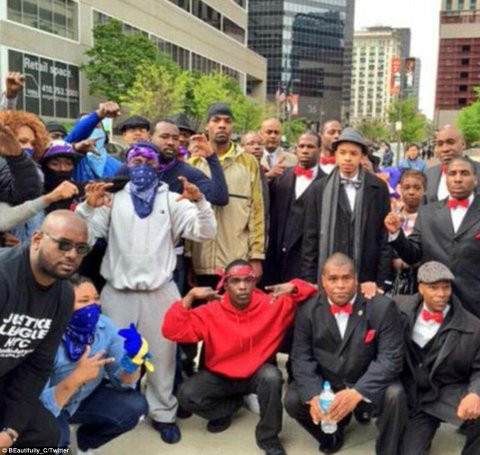Baltimore council denies police claims of Bloods and Crips cop killing pact

Baltimore City Council's president invited men dressed in gang insignia into City Hall and said that police claims of a cop-killing pact between the Bloods and Crips gangs were false.
Addressing reporters, Bernard C "Jack" Young said that officers had been wrong to claim that the gangs, as well as the Black Guerrilla Family, had pledged to "take out" police officers in the wake of the death of Freddie Gray, a 25-year-old black man who died after breaking his spine in police custody.
Flanked by men in gang insignia he said it was "clear that the notion they were planning on harming our police officers is false and simply deterred the resources we needed to focus on the individuals who instigated these riots. I applaud these young men for standing here and speaking out for our city," reports The Baltimore Sun.
Baltimore Mayor Stephanie Rawlings-Blake previously thanked the efforts of the Nation of Islam for helping to broker a truce between the gangs.
"I want also to thank the Nation of Islam, who have been very present in our efforts to keep calm and peace in our city," she stated.
Though some community leaders believe that inviting gangs has a crucial role in resolving simmering community tensions in Baltimore, others believe that inviting criminal organisations into the fold risks legitimising them.
The Bloods and Crips gangs, which originated in Los Angeles, are believed to have a combined membership of more than 60,000 people across the US, and have engaged in brutal gang warfare over control of drugs rackets.
After members of the gangs were photographed together at peaceful rallies in Baltimore on Saturday (25 April), police issued a nationwide alert that members had formed a truce and were targeting police officers.
In interviews, gang members denied the allegations on Tuesday, and said they had formed a truce in the city to promote peace.
George W Knox, director of the Chicago-based National Gang Crime Research Institute, said that the council's actions risked legitimising the gangs.
"You embolden them when you recognize them," he told The Baltimore Sun. "It gives them power and status. You are creating a bigger monster."
© Copyright IBTimes 2025. All rights reserved.




















